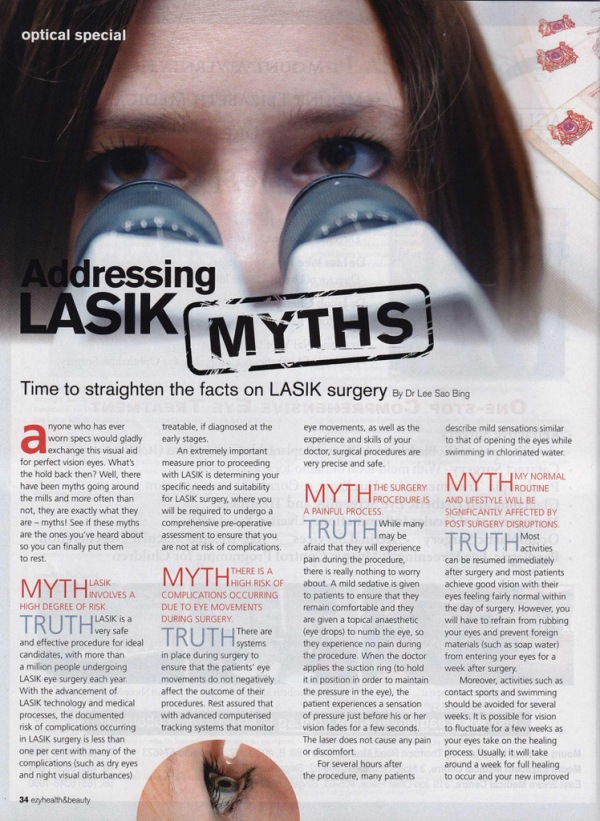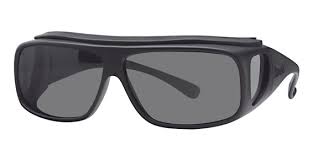Myths about LASIK Surgery
I was interviewed by Ezyhealth magazine some time back. The writer had heard quite a few common beliefs about LASIK and wondered if they were true. Enlarge the pic below to read my answers in detail. 🙂
There are more commonly asked questions about LASIK than just these listed in the article above. You may be interested in some of my other blog posts:
How to care for your eyes after LASIK surgery
Can I wear cosmetic contact lenses after LASIK?
How soon can I return to work after LASIK surgery?
10 Questions to ask your eye doctor before deciding on LASIK
Tips For Protecting Your Eyes In The Office – Part 2
I posted 3 tips on how to care for your eyes in the office last month. Click Here for that article.
Here are 4 more tips that can help you protect your eyes:
- Take frequent breaks in between work to help rest the eyes.
It is important to give your eyes a break to prevent headaches, blurry vision and dry eye. Look away or close your eyes after every half an hour of computer work. If you have dry eyes, lubricate your eyes with lubricant eye drops, this will reduce blurred vision and fatigue. Your eyes will get drier the longer you spend looking at the computer. A strong draft from the air-conditioning increases this problem.
- Increase font size of your computer screen to reduce eye strain.
Just remember that the smaller the screen means the bigger the eye health issue. Improve your reading experience by increasing the size of the font; this is helpful if you have to read long documents or spend hours entering data or editing on your computer.
- Ensure your glasses/lens prescription is appropriate for close computer work.
You can also get anti-reflective coating on your glasses to prevent glare and lens reflection. Alternatively, depending on the amount of time you work at the computer, the kind of vision correction needed and your personal preferences, you may want to get a separate pair of glasses specifically for computer work.
- Have periodic and thorough eye care examinations by an optometrist or ophthalmologist as part of a routine primary care.
Regular eye exams are crucial to maintaining healthy vision. If you find your daily lifestyle a hindrance with the inconvenience of glasses or you are constantly getting irritations and infections from contact lens wear, LASIK might be something you would want to consider as it removes your dependence on corrective wear.
Hope that these 7 tips can help you reduce eye strain and keep your eyes healthy. In addition, you may want to read about some Good Eye Care Habits.
Tips for Protecting Your Eyes in the Office – Part 1
Considering the amount of time we spend in the office and the intensity of reading that is involved on a continuous basis – both on the computer and reading of small print on documents – eye strain, headaches and visual discomfort are the most common office related health complaints.
The most obvious signs of eye strain are blurred vision, dry, irritated eyes, or headaches that become more severe while focusing at a computer screen. As these can lead to physical fatigue, poor concentration, loss of productivity, increased work errors and eventually deteriorating eyesight; here are nine useful tips to care for your eyes in the workplace.
Here are 3 tips on how to protect your eyes while in the office:
- Don’t “overwear” or mishandle your contact lenses.
It is very important to follow the proper instruction of contact lens use. Misappropriate length of wear and inadequate cleaning of lens can lead to a variety of eye infections, including some that might even cause blindness. Your eyes will get drier the longer you wear your contact lenses. If you are expecting a long day at work, do remember to bring along a pair of glasses and wear it in place of your contact lens when your eyes gets too dry in the later part of the day.
- Work in good lighting.
Office work is often visually demanding and has always required good lighting for maximum comfort and productivity. Try to angle your monitor away from light sources and windows, and make sure there is no light reflecting off the monitor, as this can also cause visual disturbances.
- Adjust the brightness and contrast of your computer screen.
Adjust the display settings on your computer so the brightness of the screen is about the same as your work environment. Tweak the brightness and contrast according to your preference to provide the best working condition.
I will provide you with more tips in a later posting. 🙂
How to avoid getting affected by various types of glare
Glare while in the sun
Many of us have experienced the glare of the sun. We tend to close our eyelids in order to block off the excessive light. Driving and sports (such as golf, tennis, boating and fishing) become more strenuous for the eyes in the bright sun.
The simple remedy to reduce this type of glare is to wear sunglasses. Choose a pair that curves to fit your face (“wraps around” your face) as this will reduce the amount of light entering through the sides.
These days there are also sunglasses that can be worn over a pair of prescriptive glasses. These look more box –like in shape and may not appeal to those who want to look fashionable, but they serve the purpose of reducing the amount of sunlight that is entering into our eyes from the top and sides.
In addition to protecting the eyes from glare, sunglasses are also vital in reducing the amount of ultra-violet (UV) light entering the eye. Excessive exposure to UV can lead to eye problems such as cataract. It is therefore vital to wear a pair of sunglasses that has 100% UV protection. Ask your optometrist the next time you visit the optical store for sunglasses that have good UV protection. Do note that a darker shade of sunglasses does not necessarily mean better UV protection.
Glare from sunlight reflected off shiny surfaces
Sunlight that is reflected off water or snow can be very glaring. The best type of sunglasses to reduce such glare is to use polarized sunglasses. This refers to a type of lens that can block light rays in one meridian and let in light rays of the other meridian, 90 degrees to the one being blocked.
Please read this other blog post of mine to learn about polarized sunglasses: click HERE.
Polarized glasses are great when used to view reflective surfaces. They reduce the glare from such surfaces and allow a person to see better. Here are examples of some activities when polarized sunglasses will come in very useful:
- Driving on wet roads
- Fishing
- Boating
- Skiing
Glare at night
The best example of such glare is those we experience while driving on a dimly lit road with the headlamps of oncoming cars shining into our eyes. Those with high short-sightedness, high astigmatism and naturally large pupils in the dim light are more susceptible to this type of glare. Ensuring that your glasses or contact lenses are of the appropriate degree will help minimize the amount of glare. Do not compromise on safety – for those that are not comfortable with the amount of glare, it is better not to drive on dimly lit roads.
Glare from screens of devices
With the advancement of technology, it is probable that all of us have a device in front of us for a certain length of time each day. This may be a television, a computer screen, a laptop or a smart phone. The more time we spend staring at such screens, the more likely we are to suffer from glare if the lighting is inappropriate.
Tips for using such devices:
(1) Adjust the brightness and contrast till it is comfortable to your eyes
(2) Always have adequate lighting in the room while using such devices
(3) Turn the device away from sunlight that reflects off the screen and into your eyes.
(4) Do not sit too near. For example, it is good to use the computer about 50 cm away.
You may also be interested in these other posts:
(1) Why does glare affect us more as we age?






